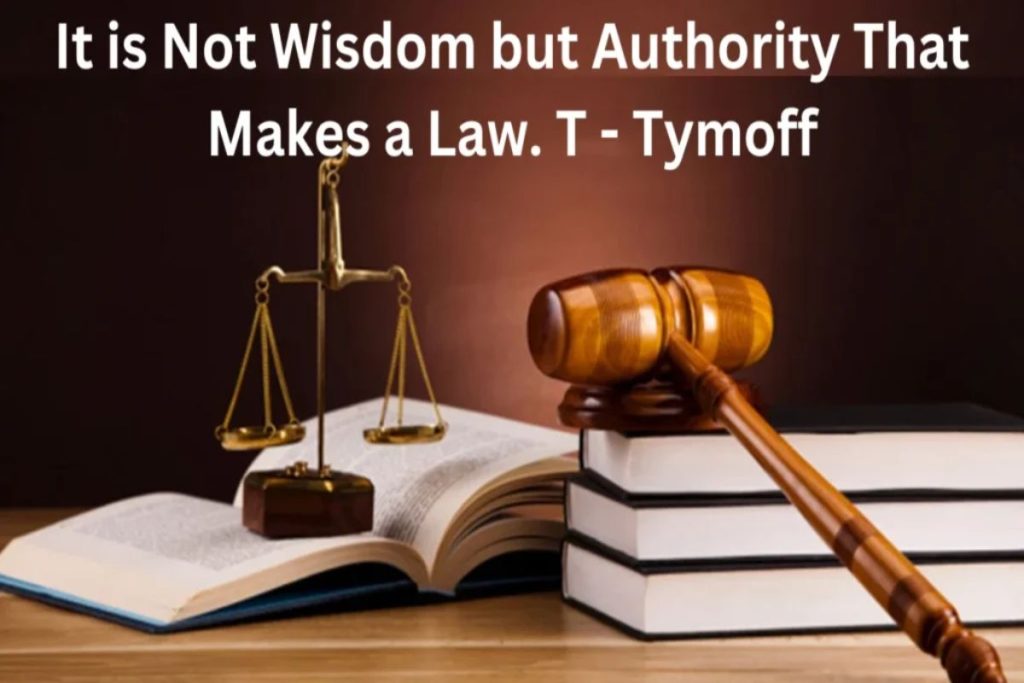Table of Contents
Introduction:
In the kingdom of legal philosophy, the age-old debate over origin and foundation of law continues to attract mind of scholars and practitioner alike. One interesting viewpoint that challenges conventional wisdom come from T. Tymoff, who offensively asserts, “It is not wisdom but authority that makes law.” This statement raise profound question about nature of law, role of wisdom, and significance of Authority in shaping legal system. In this article, we will research into T. Tymoff’s perspective, examining the implication of prioritizing Authority over wisdom in context of law.
Understanding T. Tymoff’s Perspective
Tymoff’s assertion suggests departure from the commonly held belief that laws are craft based on sound reasoning, ethical principle, and societal consensus – characteristic often associate with wisdom. Instead, Tymoff suggest that Authority, vested in particular entity or institution, is primary force behind creation and enforcement of laws.
The Primacy of Authority
To comprehend T. Tymoff’s viewpoint, it is essential to explore concept of Authority in context of law. Authority, in this sense, refer to power and legitimacy granted to governing body or institution to dictate and enforce rule within society. Tymoff deal with that source of law’s justice lies not in wisdom of its content but in Authority vested in those who enact and uphold it.
Historical Perspectives on Authority in Law
We examine historical examples and instances where Authority played pivotal role in shaping legal systems. Monarchies, autocracies, and other forms of centralized rule often relied on the Authority of a sovereign to spread laws, irrespective of the wisdom underlying them. T. Tymoff’s perspective prompts us to reexamine historical narratives that emphasize inherent wisdom of legislative bodies, urging closer inspection of role authority played in shaping legal frameworks throughout history.
Challenges to T. Tymoff’s Assertion
While T. Tymoff’s perspective challenge conventional wisdom, it is not without it critics. Skeptic argue that wisdom, combination of knowledge, experience, and ethical discernment, are essential to effective lawmaking. They contend that law born out of wisdom are more likely to reflect values and need of society, fostering just and equitable legal system.
Authority and its Influence on Legal Systems
In many legal system, Authority is assigned in governmental bodies, legislatures, and other institutions responsible for creating and enforcing laws. T. Tymoff’s perspective imply that decision made by these authoritative figure may not always rooted in wisdom or rationality. It raise critical question about legitimacy and fairness of laws when they are crafted based on Authority alone.
The Dangers of Disregarding Wisdom
Accepting T. Tymoff’s viewpoint leads us to ponder potential pitfall of sidelining wisdom in legislative process. In this context, wisdom refer to collective intelligence, ethical consideration, and foresight that should ideally inform creation of law. Ignoring wisdom in favor of unchecked Authority may result in legislation that lack moral foundation, social consequence, and long-term viability.
Understanding Statement by Tymoff
- The Role of Authority in Lawmaking
Analysis of how Authority, rather wisdom, often drive creation and enforcement of law.
- The Need for Wisdom in Governance
We discussed importance of wisdom in guiding authoritative decision and creating just law.
Historical Perspective on Authority and Wisdom in Law
- Examples from History
I was looking at historical instance where Authority overshadowed wisdom in lawmaking and resulting consequences.
- Lessons Learned
Understanding how past event have influence modern legal system and continuous interaction between wisdom and Authority.
Authority vs. Wisdom: The Modern Legal Context
- Current Legal Systems
We are examining how contemporary legal systems balance Authority and wisdom, with examples from different countries.
- Challenges and Critiques
We are discussing the challenges faced in ensuring that laws are reflection of both Authority and wisdom.
The Ideal Balance: Is It Achievable?
We are exploring the possibility of achieving ideal balance between Authority and wisdom in lawmaking. This section will include opinion from legal expert, philosopher, and historical viewpoint.
Impact on Society and Governance
We are delving into how balance (or imbalance) between Authority and wisdom in lawmaking impact society, governance, and individual right. This section will explore both positive and negative outcome of this dynamic.
How do wisdom and Authority influence lawmaking?
Wisdom provides the intellectual substance of laws, while Authority enacts and enforces them. Together, they shape our legal landscape.
Can laws be changed without Authority?
No, laws require Authority enacted, modified, or enforced. Wisdom alone cannot bring about legal change.
What happens when wisdom and Authority conflict?
Conflicts between wisdom and Authority can lead to legal controversies and debates. Finding a harmonious balance is essential.
Are there example of wisdom-driven legal change?
Historical figure like Mahatma Gandhi and Martin Luther King Jr. use wisdom to catalyze legal change through peaceful activism.
Conclusion
The statement by Tymoff highlights a critical aspect of lawmaking: the distinction and relationship between Authority and wisdom. While Authority is essential for the enforcement of laws, wisdom is crucial for ensuring fairness and justice. This balance is vital for development of healthy legal system and society. Instead, their symbiotic relationship breathes life into our legal systems. Knowledge provides guiding principle, while Authority give them power. Together, they navigate complex law journey, shaping society and ensuring justice prevail.
